实验3:OpenFlow协议分析实践
一、实验目的
1.能够运用 wireshark 对 OpenFlow 协议数据交互过程进行抓包;
2.能够借助包解析工具,分析与解释 OpenFlow协议的数据包交互过程与机制。
二、实验环境
Ubuntu 20.04 Desktop amd64
三、实验要求
(一)基本要求
1.搭建下图所示拓扑,完成相关 IP 配置,并实现主机与主机之间的 IP 通信。用抓包软件获取控制器与交换机之间的通信数据。
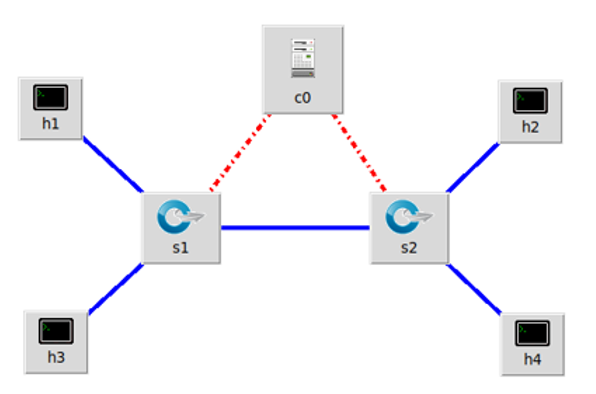
| h1 | 192.168.0.101/24 |
|---|---|
| h2 | 192.168.0.102/24 |
| h3 | 192.168.0.103/24 |
| h4 | 192.168.0.104/24 |
IP和拓扑

2、查看抓包结果,分析OpenFlow协议中交换机与控制器的消息交互过程,画出相关交互图或流程图。
HELLO
控制器6633端口(我最高能支持OpenFlow 1.0) ---> 交换机56208端口
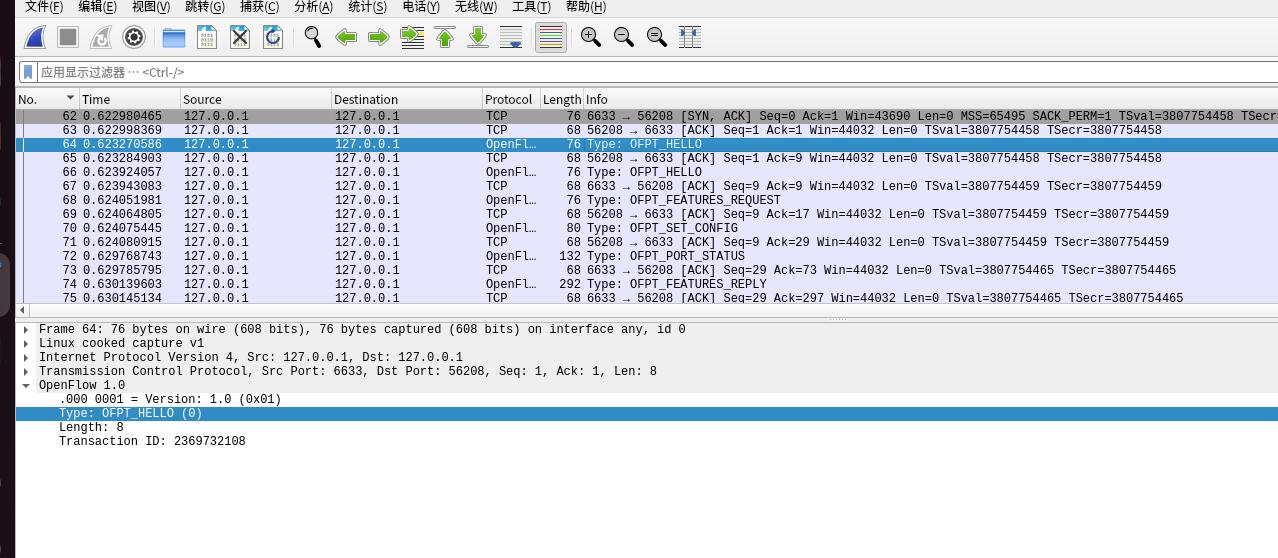
交换机56208端口(我最高能支持OpenFlow 1.5) ---> 控制器6633端口
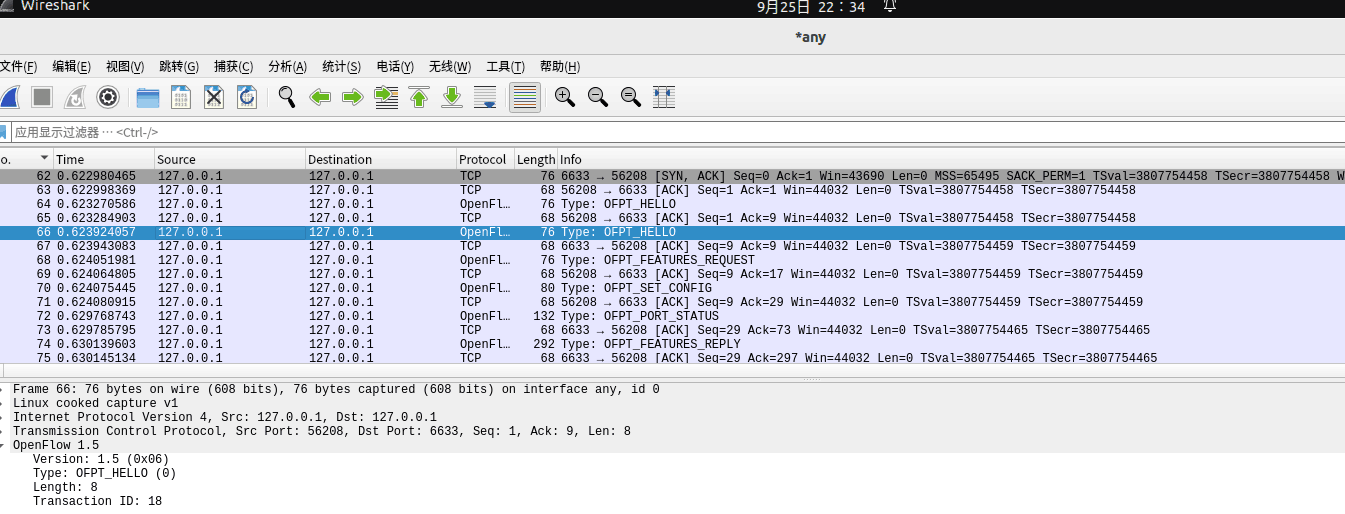
于是双方建立连接,并使用OpenFlow 1.0
FEATURES_REQUEST
控制器6633端口(我需要你的特征信息) ---> 交换机56208端口
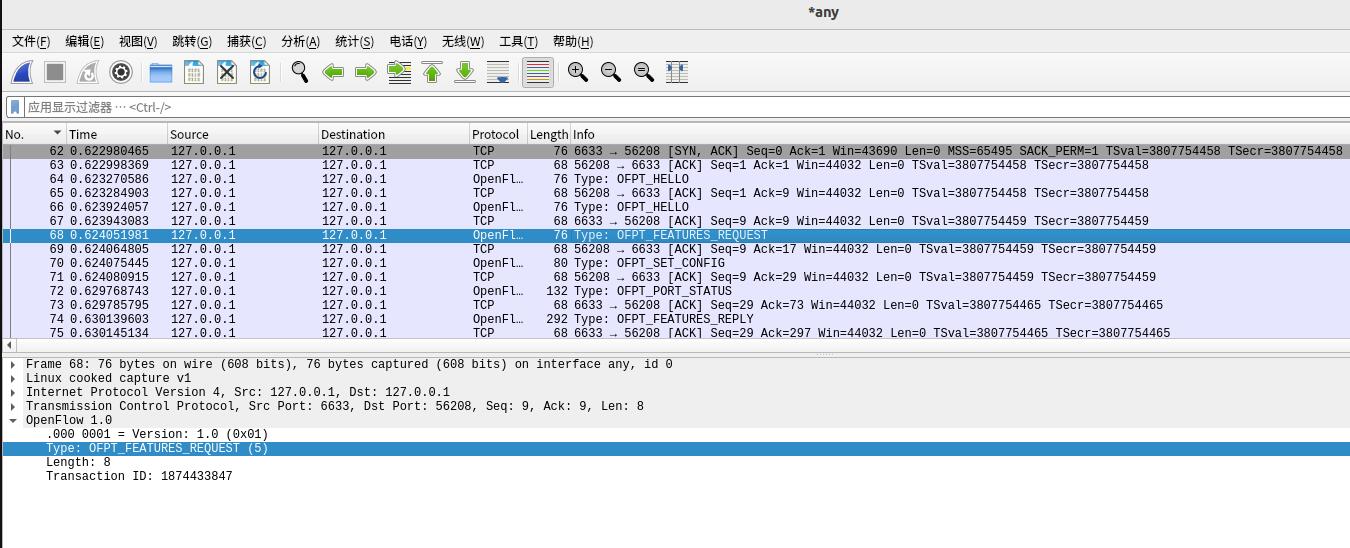
SET_CONFIG
控制器6633端口(请按照我给你的flag和max bytes of packet进行配置) ---> 交换机56208端口
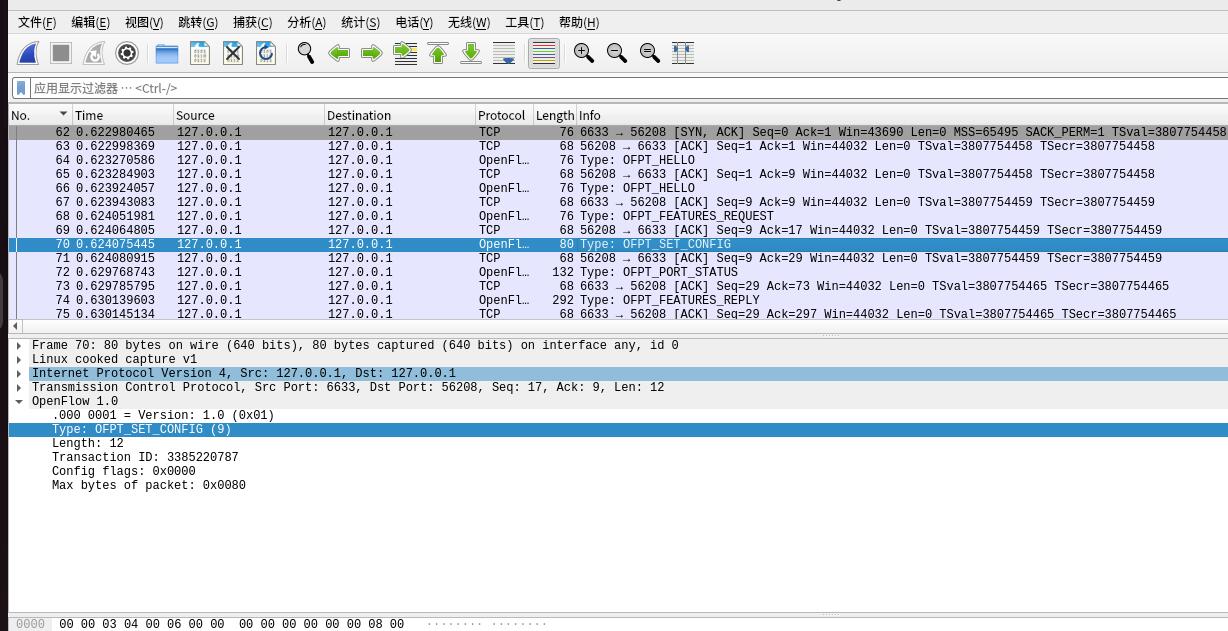
PORT_STATUS
当交换机端口发生变化时,告知控制器相应的端口状态。
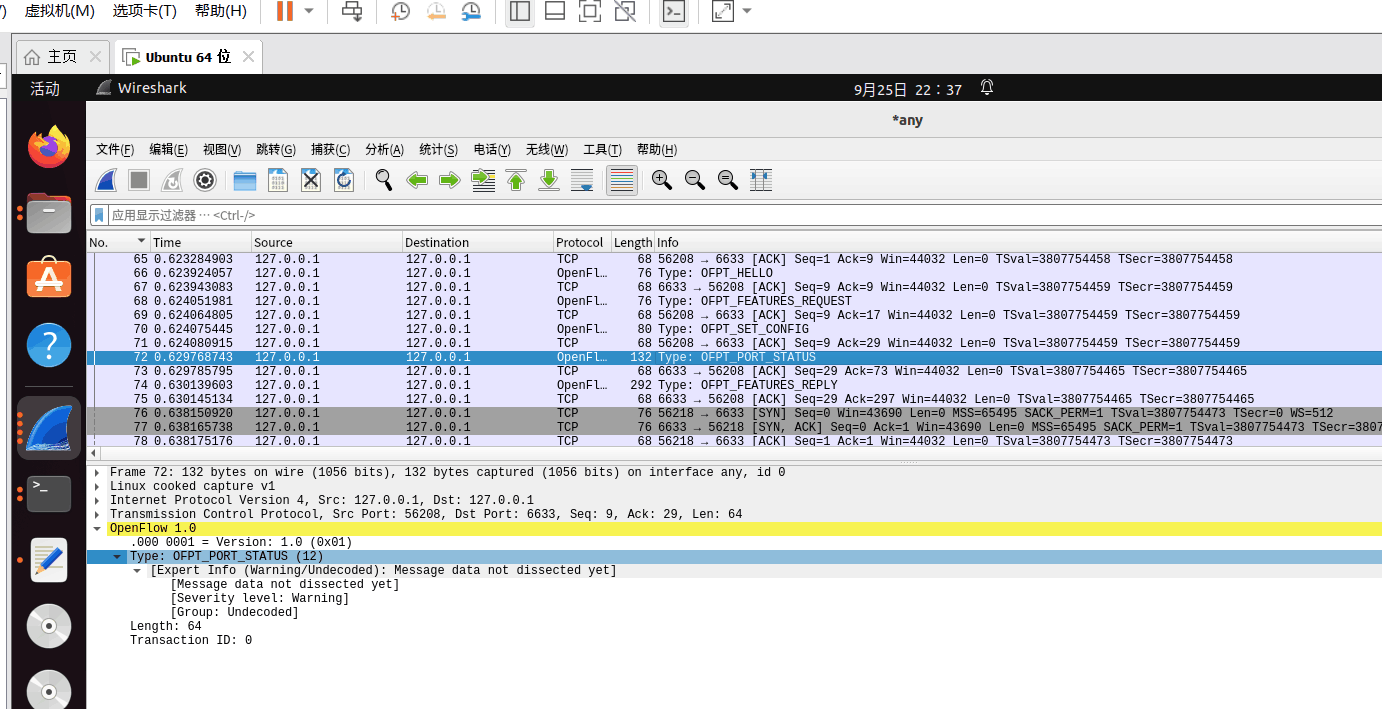
FEATURES_REPLY
交换机56208端口(这是我的特征信息,请查收) ---> 控制器6633端口
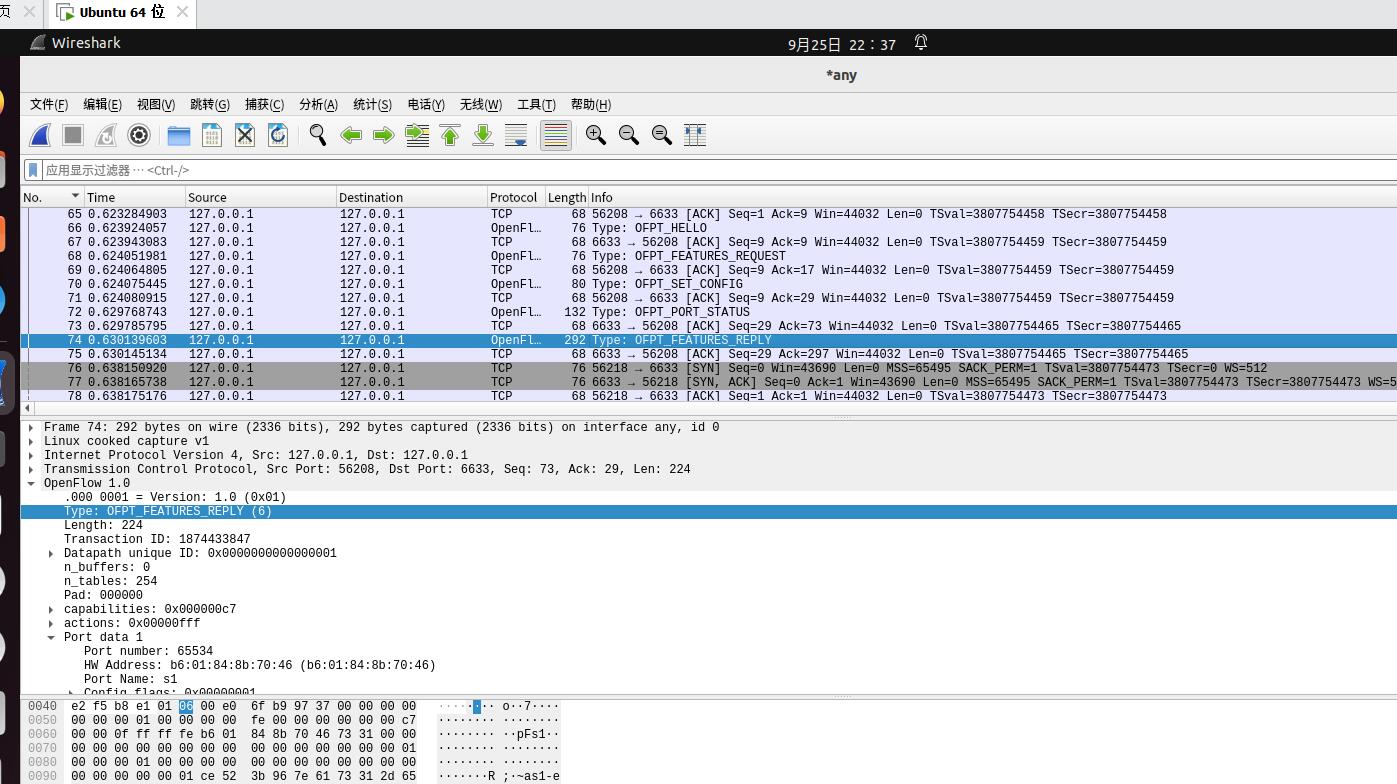
PACKET_IN
交换机56208端口(有数据包进来,请指示)--->控制器6633端口
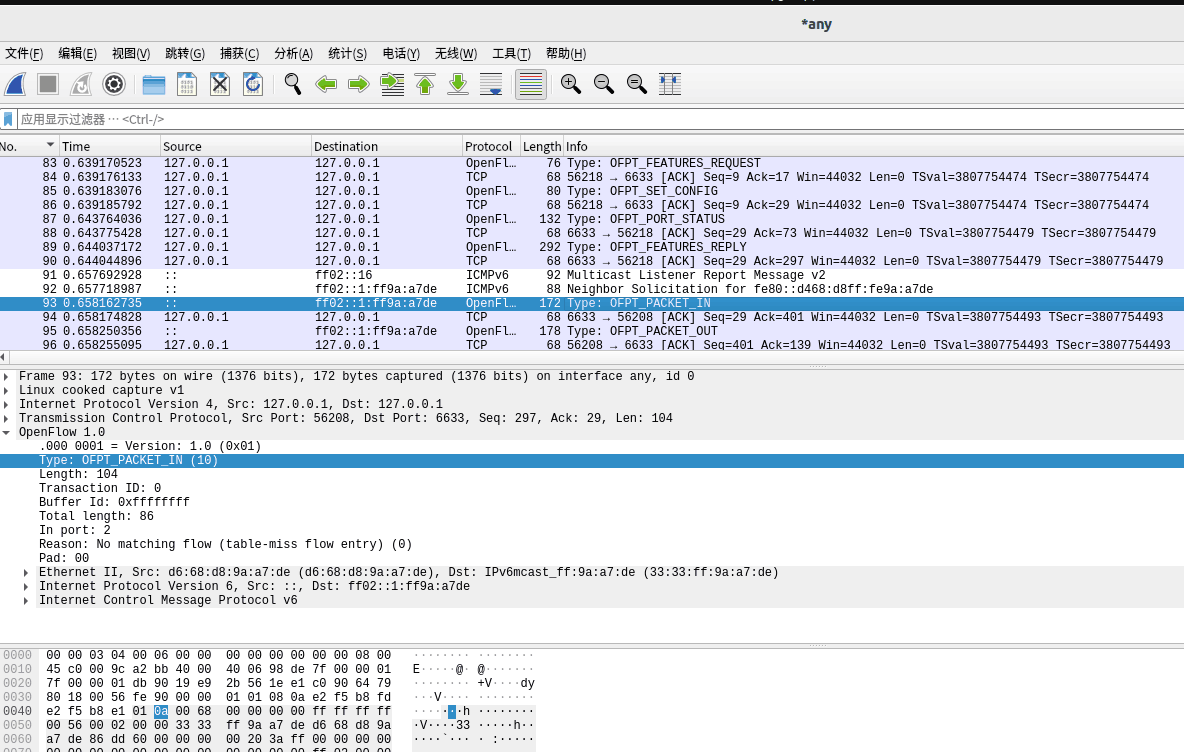
PACKET_OUT
控制器6633端口--->交换机56208端口(请按照我给你的action进行处理)
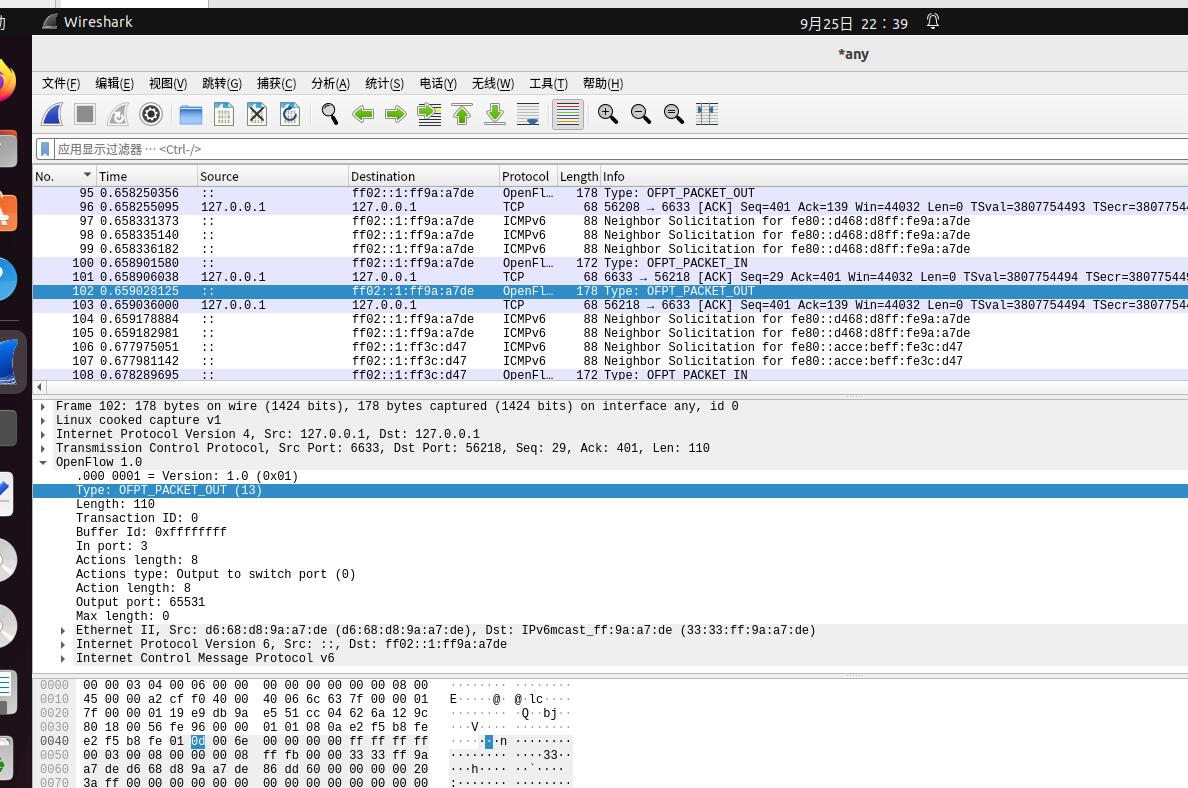
FLOW_MOD
分析抓取的flow_mod数据包,控制器通过6633端口向交换机56208端口、交换机36528端口下发流表项,指导数据的转发处理
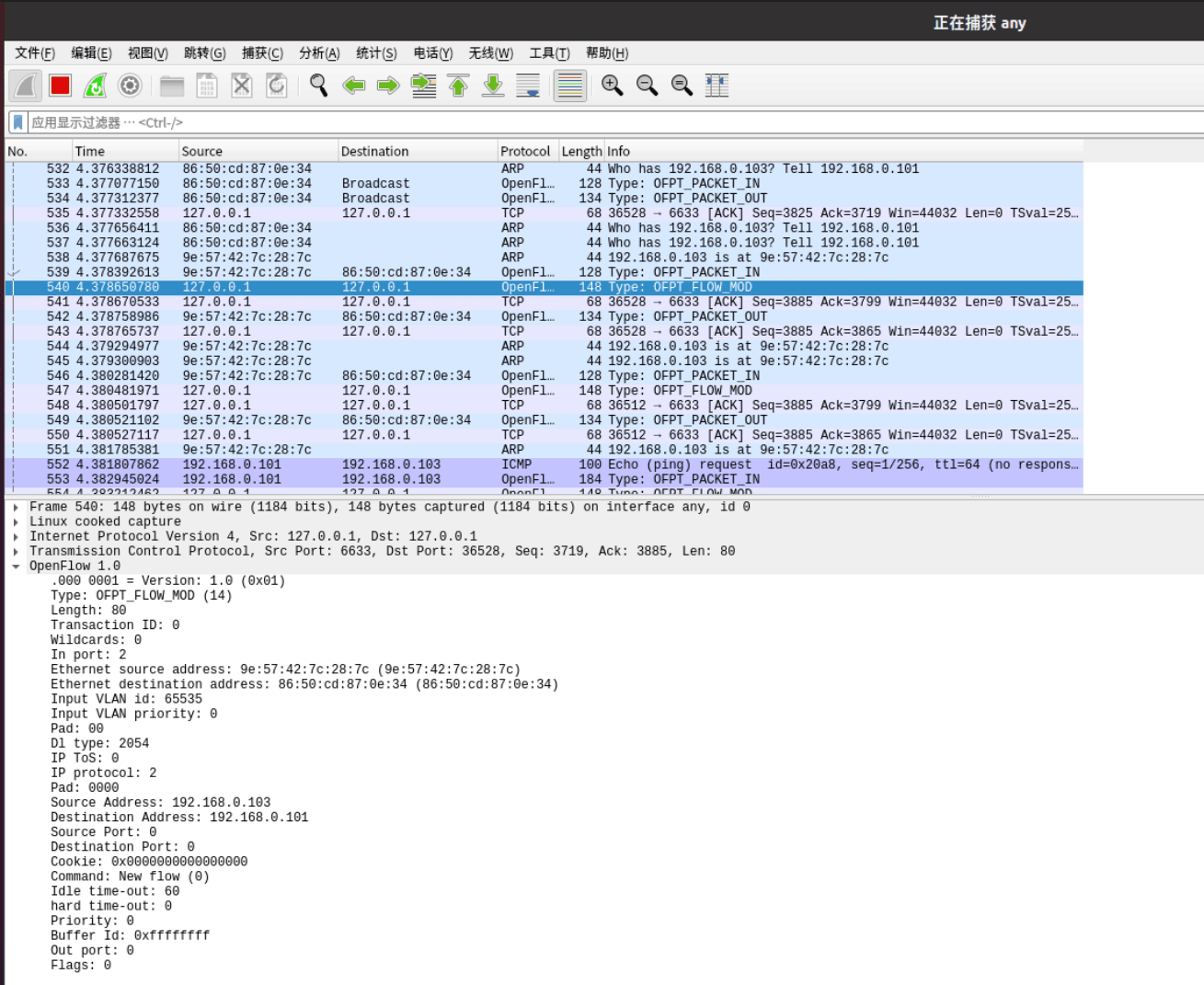
分析OpenFlow协议中交换机与控制器的消息交互过程,画出相关交互图或流程图
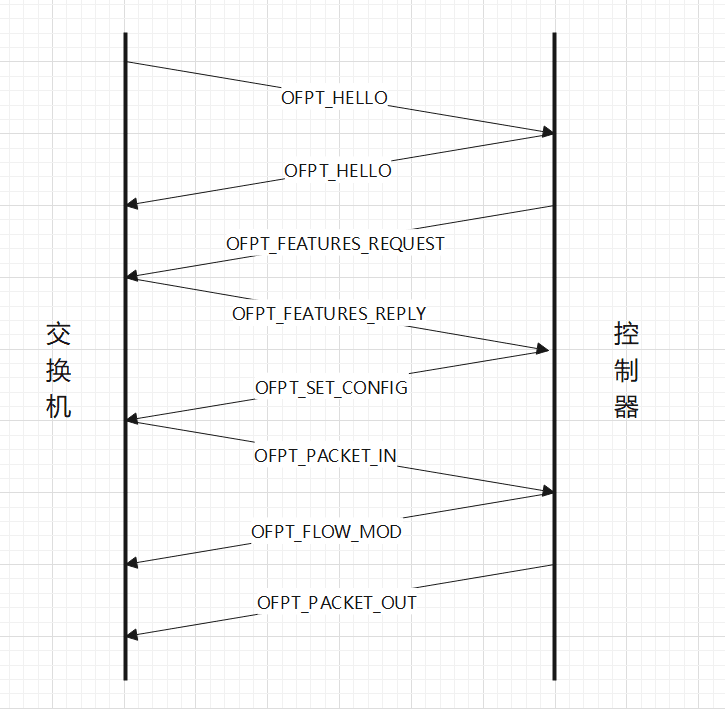
回答问题:交换机与控制器建立通信时是使用TCP协议还是UDP协议?
(Transmission Control Protocol)TCP协议
1.hello
点击查看代码
struct ofp_header {
uint8_t version; /* OFP_VERSION. */
uint8_t type; /* One of the OFPT_ constants. */
uint16_t length; /* Length including this ofp_header. */
uint32_t xid; /* Transaction id associated with this packet.
Replies use the same id as was in the request
to facilitate pairing. */
};
点击查看代码
struct ofp_header {
uint8_t version; /* OFP_VERSION. */
uint8_t type; /* One of the OFPT_ constants. */
uint16_t length; /* Length including this ofp_header. */
uint32_t xid; /* Transaction id associated with this packet.
Replies use the same id as was in the request
to facilitate pairing. */
};
点击查看代码
/* Switch configuration. */
struct ofp_switch_config {
struct ofp_header header;
uint16_t flags; /* OFPC_* flags. */
uint16_t miss_send_len; /* Max bytes of new flow that datapath should
send to the controller. */
};
4、PORT_STATUS
点击查看代码
/* A physical port has changed in the datapath */
struct ofp_port_status {
struct ofp_header header;
uint8_t reason; /* One of OFPPR_*. */
uint8_t pad[7]; /* Align to 64-bits. */
struct ofp_phy_port desc;
};
点击查看代码
/* Switch features. */
struct ofp_switch_features {
struct ofp_header header;
uint64_t datapath_id; /* Datapath unique ID. The lower 48-bits are for
a MAC address, while the upper 16-bits are
implementer-defined. */
uint32_t n_buffers; /* Max packets buffered at once. */
uint8_t n_tables; /* Number of tables supported by datapath. */
uint8_t pad[3]; /* Align to 64-bits. */
/* Features. */
uint32_t capabilities; /* Bitmap of support "ofp_capabilities". */
uint32_t actions; /* Bitmap of supported "ofp_action_type"s. */
/* Port info.*/
struct ofp_phy_port ports[0]; /* Port definitions. The number of ports
is inferred from the length field in
the header. */
};
6、PACKET_IN
点击查看代码
struct ofp_packet_in {
struct ofp_header header;
uint32_t buffer_id; /* ID assigned by datapath. */
uint16_t total_len; /* Full length of frame. */
uint16_t in_port; /* Port on which frame was received. */
uint8_t reason; /* Reason packet is being sent (one of OFPR_*) */
uint8_t pad;
uint8_t data[0]; /* Ethernet frame, halfway through 32-bit word,
so the IP header is 32-bit aligned. The
amount of data is inferred from the length
field in the header. Because of padding,
offsetof(struct ofp_packet_in, data) ==
sizeof(struct ofp_packet_in) - 2. */
};
7、PACKET_OUT
点击查看代码
struct ofp_packet_out {
struct ofp_header header;
uint32_t buffer_id; /* ID assigned by datapath (-1 if none). */
uint16_t in_port; /* Packet's input port (OFPP_NONE if none). */
uint16_t actions_len; /* Size of action array in bytes. */
struct ofp_action_header actions[0]; /* Actions. */
/* uint8_t data[0]; */ /* Packet data. The length is inferred
from the length field in the header.
(Only meaningful if buffer_id == -1.) */
};
点击查看代码
struct ofp_flow_mod {
struct ofp_header header;
struct ofp_match match; /* Fields to match */
uint64_t cookie; /* Opaque controller-issued identifier. */
/* Flow actions. */
uint16_t command; /* One of OFPFC_*. */
uint16_t idle_timeout; /* Idle time before discarding (seconds). */
uint16_t hard_timeout; /* Max time before discarding (seconds). */
uint16_t priority; /* Priority level of flow entry. */
uint32_t buffer_id; /* Buffered packet to apply to (or -1).
Not meaningful for OFPFC_DELETE*. */
uint16_t out_port; /* For OFPFC_DELETE* commands, require
matching entries to include this as an
output port. A value of OFPP_NONE
indicates no restriction. */
uint16_t flags; /* One of OFPFF_*. */
struct ofp_action_header actions[0]; /* The action length is inferred
from the length field in the
header. */
};
个人总结
1、本次实验中通过wireshark工具了解了OpenFlow 协议数据交互过程,交互过程中各种信息的往来,及相对应的含义
2、本次实验学会通过滤器输入“openflow_v1”或“openflow_v4”等进行数据包过滤,运用 wireshark 对 OpenFlow 协议数据交互过程进行抓包;借助包解析工具,分析与解释 OpenFlow协议的数据包交互过程与机制;将抓包结果对照OpenFlow源码,和上网查阅资料知晓OpenFlow 消息的类型和具体含义
3、在实验过程中第一次使用wireshark时并没有考虑另一个hello协议的交互并不一定基于openflow 1.0,事实也证明了另一项hello的协议基于openflow 1.5,因此在第一次直接通过通过滤器输入“openflow_v1”或“openflow_v4”等进行数据包过滤,会出现一次hello的情况(无目的地址向源地址发送hello的数据报)。


 浙公网安备 33010602011771号
浙公网安备 33010602011771号